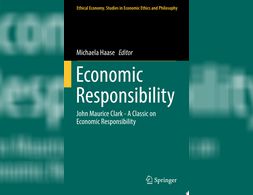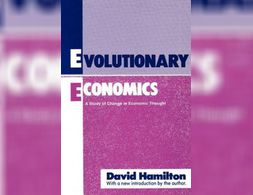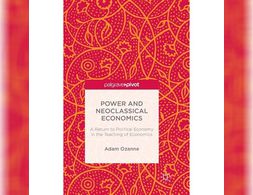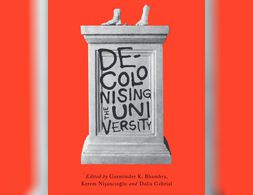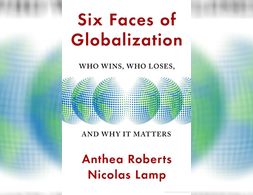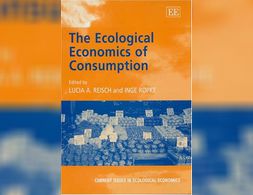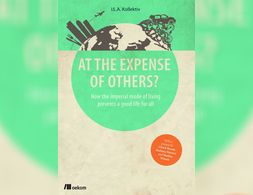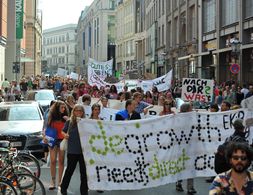✕
298 results
Taking as its starting point the interdependence of the economy and the natural environment, this book provides a comprehensive introduction to the emerging field of ecological economics.
This brief views the environment through diverse lenses – those of standard economics, institutional economics, political science, environmental science and ecology.
John Maurice Clark’s article “The Changing Basis of Economic Responsibility,“ published in the Journal of Political Economy, is the topical starting point for all scholars interested in economic responsibility and responsible economic action.
New Tools of Economic Dynamics gives an introduction and overview of recently developed methods and tools, most of them developed outside economics, to deal with the qualitative analysis of economic dynamics. It reports the results of a three-year research project by a European and Latin American network on the intersection of economics with mathematical, statistical, and computational methods and techniques.
That’s why it is time, says renegade economist Kate Raworth, to revise our economic thinking for the 21st century. In Doughnut Economics, she sets out seven key ways to fundamentally reframe our understanding of what economics is and does.
Smith contends that there is no possible solution to our global ecological crisis within the framework of any conceivable capitalism. The only alternative to market-driven planetary collapse is to transition to a largely planned, mostly publicly-owned economy based on production for need, on democratic governance and rough socio-economic equality, and on contraction and convergence between the global North and South.
In reviewing this book in The Economic Journal, S.G. Checkland said that it should be read as a vigorous attempt to relate economics to general thinking and as a challenge to those who are practitioners or elaborators of narrowly prescribed techniques.
Mainstream economics almost completely ignores the role power plays in determining economic outcomes, which means it can only provide partial explanations of the distribution of wealth and income, and of the problems associated with inequality and poverty.
Ecological economics addresses one of the fundamental flaws in conventional economics--its failure to consider biophysical and social reality in its analyses and equations. Ecological Economics: Principles and Applications is an introductory-level textbook that offers a pedagogically complete examination of this dynamic new field.
How Covid Shook the World s Economy Deftly weaving finance politics business and the global human experience into one tight narrative a tour de force account of 2020 the year that changed everything from the acclaimed author of Crashed The shocks of 2020 have been great and small disrupting the …
In this book, the authors, Cinzia Aruzza, Tithi Bhattcahrya, and Nancy Fraser, move away from the myopic view of feminism for a select few to focus on a universal idea of feminism.
Modern Monetary Theory and the Birth of the People s Economy The leading thinker and most visible public advocate of modern monetary theory the freshest and most important idea about economics in decades delivers a radically different bold new understanding for how to build a just and prosperous society Stephanie …
Well-rounded insights with essay contributions from various perspectives into what it means to decolonize higher education.
From Marketisation to Armed Conflict Since 1991 nominally independent Ukraine has been in turmoil with the Orange Revolution and the Maidan protests marking its most critical moments Now its borders are threatened and the civil unrest and armed conflict continue to destabilise the country In order to understand these dramatic …
Gender Development and Globalization is the leading primer on global feminist economics and development. Gender is a development issue because social considerations are not easily incorporated into institutions such as policies, regulations, markets and organizations. This process is often referred to as the mainstreaming of gender in development institutions.
An ideal type of a pluralistic book. Instead of arguing for one specific interpretation of a complex phenomenon, the authors present six different views on globalisation. Roberts and Lamp carefully balance the different perspectives, presenting the merits of each.
In this searing and insightful critique, Adrienne Buller examines the fatal biases that have shaped the response of our governing institutions to climate and environmental breakdown, and asks: are the 'solutions' being proposed really solutions? Tracing the intricate connections between financial power, economic injustice and ecological crisis, she exposes the myopic economism and market-centric thinking presently undermining a future where all life can flourish.
This course will focus on the emergence and evolution of industrial societies around the world We will begin by comparing the legacies of industry in ancient and early modern Europe and Asia and examining the agricultural and commercial advances that laid the groundwork for the Industrial Revolution of the 18th …
A Plan to Save the Future from Extinction Climate Change and Pandemics A plan to save the earth and bring the good life to all In this thrilling and capacious book Troy Vettese and Drew Pendergrass challenge the inertia of capitalism and the left alike and propose a radical plan …
Research on consumption from an environmental perspective has exploded since the late 1990s. This important new volume cuts across disciplines to present the latest research in the field. The book is divided into three parts, the first of which addresses the problems of consumption both as a concept and as an economic and social force with high environmental impact.
The objective of this MOOC is to develop an understanding of the problems related to water management. Firstly, this course will define a resource and, more specifically, the resource of water. It will look at how water is used and the activities associated with it as well as any potential conflicts. The course will look at water management in detail through the analysis of the different types of rights and obligations associated with, for example, the development of a multi-sectorial regulation system or a watershed management approach.
This course is part of the SDG initiative addressing the UN Sustainable Development Goals, specifically for the following SDGs [1, 8, 10 and 16].
Today it feels like everybody is talking about the problems and crises of our times: the climate and resource crisis, Greece's permanent socio-political crisis or the degrading exploitative practices of the textile industry.
Free, Fair & Alive is a foundational re-thinking of the commons, the self-organized social systems that human beings have used for millennia to meet their needs.
A comprehensive account of how government deficits and debt drive inflation
Adhering to the multiplicity of degrowth whilst also arguing that strategic prioritisation and coordination are key, Degrowth & Strategy advances the debate on strategy for social-ecological transformation. It explores what strategising means, identifies key directions for the degrowth movement, and scrutinises strategies in practice that aim to realise a degrowth society.
Since the Middle Ages, literature has portrayed the economic world in poetry, drama, stories and novels. The complexity of human realities highlights crucial aspects of the economy. The nexus linking characters to their economic environment is central in a new genre, the "economic novel", that puts forth economic choices and events to narrate social behavior, individual desires, and even non-economic decisions.
This guide contains a collection of recommended YouTube channels and YouTube videos in the fields of economics, business and economic policy.
More Heat Than Light is a history of how physics has drawn some inspiration from economics and also how economics has sought to emulate physics, especially with regard to the theory of value. It traces the development of the energy concept in Western physics and its subsequent effect upon the invention and promulgation of neoclassical economics.
The concept of financialisation has undergone a similar career as ‘globalisation’, ‘neoliberalism’ or even ‘capitalism’, in the course of which it changed from the explanandum to the explanans; the process of financialisation is taken for granted, while the concrete historical and empirical causal conditions of its realisation and perpetuation are being moved into the background.
Wealth inequality between Black and white people in the US barely has changed in the last 150 years. In her book "The Color of Money. Black Banks and the Racial Wealth Gap" Mehrsa Baradaran, analyzes why also Black banks have not successfully changed this and not enabled Black wealth on a broader scale.
Michael Kalecki famously remarked “I have found out what economics is; it is the science of confusing stocks with flows”. Stock-Flow Consistent (SFC) models were developed precisely to address this kind of confusion. The basic intuition of SFC models is that the economy is built up as a set of intersecting balance sheets, where transactions between entities are called flows and the value of the assets/liabilities they hold are called stocks. Wages are a flow; bank deposits are a stock, and confusing the two directly is a category error. In this edition of the pluralist showcase I will first describe the logic of SFC models – which is worth exploring in depth – before discussing empirical calibration and applications of the models. Warning that there is a little more maths in this post than usual (i.e. some), but you should be able to skip those parts and still easily get the picture.
We use cookies on our website. Click on Accept to help us to make Exploring Economics constantly better!



